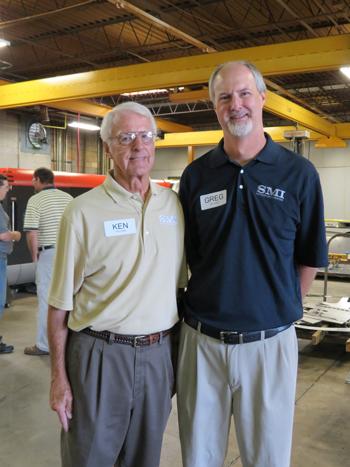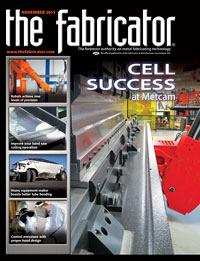Senior Editor
- FMA
- The Fabricator
- FABTECH
- Canadian Metalworking
Categories
- Additive Manufacturing
- Aluminum Welding
- Arc Welding
- Assembly and Joining
- Automation and Robotics
- Bending and Forming
- Consumables
- Cutting and Weld Prep
- Electric Vehicles
- En Español
- Finishing
- Hydroforming
- Laser Cutting
- Laser Welding
- Machining
- Manufacturing Software
- Materials Handling
- Metals/Materials
- Oxyfuel Cutting
- Plasma Cutting
- Power Tools
- Punching and Other Holemaking
- Roll Forming
- Safety
- Sawing
- Shearing
- Shop Management
- Testing and Measuring
- Tube and Pipe Fabrication
- Tube and Pipe Production
- Waterjet Cutting
Industry Directory
Webcasts
Podcasts
FAB 40
Advertise
Subscribe
Account Login
Search
How one job shop retains skilled talent
Southern Metalcraft’s secret for hiring and keeping good people
- By Tim Heston
- November 25, 2013
- Article
- Shop Management

Ken Williams (left), who founded Southern Metalcraft Inc. in 1974, stepped away from day-to-day operations in January. His son Greg (right) now leads the business as president and chief operating officer.
Leading a tour of Southern Metalcraft Inc. (SMI) in Lithonia, Ga., company founder Ken Williams pointed to some wall pockmarks near the entrance to the fabricator’s second building, which the company purchased in 1994. His daughter, a longtime softball catcher, attended college on a sports scholarship. Before moving any equipment into the new space, Williams helped her set up a high-speed pitching cage—and the pockmarks left by a few stray balls still are on the wall.
Why is this story significant? Because most of the company’s 31 employees were there at the time. “The average employee tenure here is 20 years,” Williams said, “but we have people that have been with us for more than 30 years. In fact, the second person we hired is still here.”
Williams made the comment during The FABRICATOR’s Technology Summit, an early October event organized by the Fabricators & Manufacturers Association International that featured several shop tours around the Atlanta metro area.
Many of the 60 people listening to Williams talk smiled. The day before, most attendees had participated in roundtable discussions about smart use of technology. The discussion quickly turned to skilled labor. Modern technology has made fabricators globally competitive, but they still need to find good people to manage that technology.
During the tour, Williams passed by a welder working on a rolled cylinder.
“How many years have you been here?” Williams asked.
“Twenty-three,” he said.
Williams then turned back to the tour group. “He’s a rookie.”
Like any shop owner, Williams showed off equipment, including the new laser cutting machine that has really changed how the company produces parts. He launched the company in 1974, producing components for diesel locomotives. After that 11-month project came to an end, Williams branched out to diversify, and never really stopped. During the tour he pointed out myriad projects: food processing equipment; military-related work; the sheet metal assembly for a packaging machine; the structural metal frame for a machine that automates the production of concrete bricks.
But all this really wasn’t Williams’ focus during the tour. Instead, he primarily talked about workers and their expertise. He pointed out a programmer who started out running a duplicator more than two decades ago. The shop still has one in the corner, and the programmer still knows how to run it.
He pointed to another person, now semiretired, who came into the shop briefly to say hello to the FMA tour group. “He’s my age, and I’m 75,” Williams said. “I’ve known him a long, long time. He went to the same church my wife went to before she married me. At the end of 2010 he told me he wanted to retire at the end of 2011. So he did, but by February 2012 he was back, working part-time. He missed it.”
Why did he miss it? It wasn’t because of the mechanical magic of modern machine tools. For most of his tenure, he drove the delivery truck, talked with customers, and built relationships. “We see the delivery person as one of our most important people,” Williams said. “He sees the customer more than we do.”
After listening to Williams talk, it doesn’t take long to realize that faith and family drive his very being. “It’s why I don’t worry,” he said. “People say that I do, but I promise you, I really don’t.”
Community may be one reason that SMI has had such success retaining employees. Employees work well together, and each has a core area of expertise. But Williams doesn’t say “they’re like family.” They all have their own lives outside work. It’s a collaborative, supportive environment, for sure, but purely professional.
Admittedly, all this talk of community and family can seem like empty statements in much of the business world, where people are hired and fired with the business cycle, but Williams has supported his talk with action. During the Great Recession, SMI didn’t let anyone go, opting instead for pay cuts and reduced hours. It was painful, but everyone kept their job.
Since the beginning SMI has paid for all employee medical expenses; no premium is deducted from anyone’s paycheck. In the 1990s the company started to cover employees’ families too. The Great Recession changed things; the company still covers employees and their children, but not working spouses. Even now employees don’t have a premium deducted from their paycheck.
Another key to retention is, of course, money. “We make sure to pay them all we can,” Williams said. He added that pay increases represent a reinvestment in the business, but managers have balanced this investment with technology upgrades. He pointed to a new press brake the company purchased not only because it offered speedy setup and greater throughput, but also because its control could be placed on the left. SMI’s longtime brake operator happens to be left-handed.
“He told us we extended his working life for three more years,” Williams said.
There’s one more important factor: time. The company always has operated on a 10-hour-day, four-day week. “Hourly people are off on Friday,” he said, “and if they do need to work overtime, they can come in on Friday and still have the weekend. I honor their time off.”
Time and trust: When you strip away everything in business, that’s basically what you have. Employees want their time at work to be productive, plus sufficient and predictable time off so they can plan and live their lives; customers want to spend as little time as possible waiting for a product. Similarly, employees want to be rewarded for their time and paid a competitive wage; customers want to pay a competitive price for that time. Binding it all together is trust. When a fabricator has all this, perhaps it has a better chance of finding and keeping good people.
During the tour, Williams summed it up a bit more broadly: “We’ve adjusted to whatever circumstances that faced us. The solution is always more important than the problem. Take that with you, go back and hire people, and keep them. That’s our secret.”
About the Author

Tim Heston
2135 Point Blvd
Elgin, IL 60123
815-381-1314
Tim Heston, The Fabricator's senior editor, has covered the metal fabrication industry since 1998, starting his career at the American Welding Society's Welding Journal. Since then he has covered the full range of metal fabrication processes, from stamping, bending, and cutting to grinding and polishing. He joined The Fabricator's staff in October 2007.
subscribe now

The Fabricator is North America's leading magazine for the metal forming and fabricating industry. The magazine delivers the news, technical articles, and case histories that enable fabricators to do their jobs more efficiently. The Fabricator has served the industry since 1970.
start your free subscription- Stay connected from anywhere

Easily access valuable industry resources now with full access to the digital edition of The Fabricator.

Easily access valuable industry resources now with full access to the digital edition of The Welder.

Easily access valuable industry resources now with full access to the digital edition of The Tube and Pipe Journal.
- Podcasting
- Podcast:
- The Fabricator Podcast
- Published:
- 04/16/2024
- Running Time:
- 63:29
In this episode of The Fabricator Podcast, Caleb Chamberlain, co-founder and CEO of OSH Cut, discusses his company’s...
- Industry Events
16th Annual Safety Conference
- April 30 - May 1, 2024
- Elgin,
Pipe and Tube Conference
- May 21 - 22, 2024
- Omaha, NE
World-Class Roll Forming Workshop
- June 5 - 6, 2024
- Louisville, KY
Advanced Laser Application Workshop
- June 25 - 27, 2024
- Novi, MI































